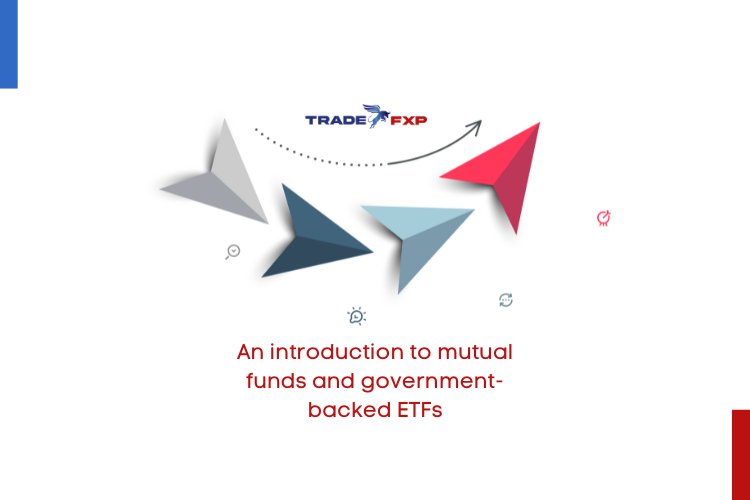An introduction to mutual funds and government-backed ETFs
Delve into our comprehensive guide on mutual funds and government-backed ETFs. Understand the investment dynamics, benefits, and strategies.

An introduction to mutual funds and government-backed ETFs
A mutual fund invests money from many investors in stocks, bonds, and other securities. Securities value mutual funds are managed by professionals. Mutual funds let investors buy and manage many securities.
Government-backed exchange-traded funds (ETFs) trade like stocks. Government-backed ETFs are mutual funds sponsored by the US Treasury or a central bank. These ETFs may invest in US Treasury bonds or other government-related securities like infrastructure or renewable energy.
Diversify and profit with mutual funds and government-backed ETFs. However, these two investment vehicles differ. ETFs track an index while mutual funds are actively managed. ETFs have lower expenses than mutual funds, which have management fees. Consider these and other factors when investing.
In India, what does the term "mutual fund" mean?
India's mutual funds buy stocks, bonds, and other securities with investor money. Securities value a mutual fund managed by a professional investment company. Indian investors can diversify their portfolios by investing in mutual funds.
SEBI regulates Indian mutual funds. India has mutual funds. Open-ended mutual funds allow investors to buy and sell units at any time, while closed-ended funds have a fixed number of stock exchange-tradeable units.
India has equity, debt, hybrid, and specialist mutual funds. Mutual funds' investors and goals vary. Consider your investment goals and risk tolerance before choosing an Indian mutual fund.
Name a few mutual funds in India.
Here are a few examples of mutual funds in India:
- HDFC Equity Fund is a mutual fund that invests in a diversified portfolio of large- and mid-cap stocks. It has no limits on how much you can invest.
- ICICI Prudential Balanced Advantage Fund: This is a hybrid mutual fund that invests in a mix of equity and debt securities.
- SBI Blue-chip Fund: This is an open-ended equity mutual fund that invests in a diversified portfolio of large-cap stocks.
- UTI Nifty Index Fund: Tracks the performance of the Nifty 50 index, a list of the 50 largest and most liquid companies listed on the National Stock Exchange.
- Reliance Growth Fund is an open-ended equity mutual fund that invests in a diversified portfolio of growth-oriented stocks.
In India, there are many mutual funds available. You should carefully research and compare different mutual funds before investing in one.
What are the benefits of investing in mutual funds?
There are several benefits to investing in mutual funds:
- Diversification: Mutual funds invest in a wide range of securities, such as stocks, bonds, and cash equivalents. This helps spread risk and reduce the effect of any one security on the fund's overall performance.
- Professional management: Professional money managers select and research investments for mutual funds. This can be helpful for people who want to invest but don't have the time or skills to manage their investments themselves.
- Ease of use: Mutual funds are easy to buy and sell, and they can be purchased through a brokerage account or directly from the fund company.
- Affordable: Mutual funds are usually affordable because they have low minimum investments. They are therefore accessible to a wide range of investors.
- Liquidity: Funds are highly liquid, which means they can be bought and sold easily.
- Transparency: Mutual funds have to tell investors what they own and how they're doing regularly. This helps investors make better decisions about their investments.
- Higher returns: Mutual funds may produce higher returns over time than other investments, such as savings accounts and CDs.
- Flexible investment options: Mutual funds offer a wide range of investment options, including funds focused on specific asset classes, industries, or regions. In this way, investors can select a fund that matches their investment goals and risk tolerance.
Investors can diversify their portfolios and gain exposure to a range of securities by investing in mutual funds.
What are the cons of mutual funds?
Mutual funds can be a good investment option for many people, but like all investments, they also have some drawbacks that you should be aware of. Here are some of the potential drawbacks of mutual funds:
- Fees: Mutual funds typically charge fees, which can eat into your returns. The fund company may charge an annual management fee in addition to other fees, such as marketing and distribution costs, to cover the cost of managing the fund.
- Lack of control: When you invest in a mutual fund, you are entrusting your money to the fund manager, who makes investment decisions on your behalf. This means you have little control over the specific investments that are included in the fund.
- Market risk: Like all investments, mutual funds are subject to market risk, which means the value of your investment may fluctuate due to changes in the stock market.
- Goals: Because mutual funds are diversified portfolios of multiple stocks, bonds, or other securities, it can be hard to tailor your investments to meet your specific financial goals.
- Potential for underperformance: Mutual funds may not always perform as well as you hope, and it's possible that your investment could lose value.
Before investing in mutual funds, you should carefully consider the potential drawbacks. To determine whether mutual funds are right for you, do your research and consult with a financial advisor.
In India, what do you mean by government-backed ETFs?
An asset management company manages a government-backed exchange-traded fund (ETF) on a stock exchange in India. The government owns these ETFs and may support them.
Government-backed ETFs in India invest in government or government-owned securities, such as state-owned enterprises or public sector undertakings. These ETFs give investors exposure to the Indian government bond market or other safe and stable sectors.
Government-backed ETFs are low-risk investments because their underlying securities are government or government-owned. Government-backed ETFs, like all investments, is risky. Consider your investment goals and risk tolerance before buying an ETF.
Why are government-backed ETFs beneficial?
There are several benefits to investing in government-backed exchange-traded funds (ETFs) in India:
- Diversification: Government-backed ETFs allow investors to diversify their portfolios by providing exposure to a broad range of government securities or sectors of the economy. This can help reduce risk and increase the stability of the portfolio.
- Liquidity: ETFs backed by the government are listed and traded on stock exchanges, so they can be bought and sold easily. Investors who need access to their funds quickly can benefit from this.
- Transparency: Government-backed ETFs disclose their holdings regularly, which allows investors to see exactly what securities the fund is invested in. This method of investing can help investors understand risks and potential rewards.
- Firms: Professional asset management firms, which can offer investors knowledge and experience in managing the fund, are in charge of managing government-backed ETFs.
- Low costs: Compared to actively managed funds, government-backed ETFs tend to have lower expense ratios, which can help lower the overall cost of investing.
It is important to note that, like all investments, government-backed ETFs carry some level of risk and may not be suitable for all investors. Consider your investment goals and your tolerance for risk before purchasing an ETF.
Are there any cons to government-backed ETFs?
Exchange-traded funds (ETFs) are investment vehicles that are traded on stock exchanges and composed of a diverse range of assets, including stocks, bonds, and other securities. Government-backed ETFs are ETFs that hold assets, such as government bonds and other securities issued by government entities.
Here are some of the potential disadvantages of government-backed ETFs:
- Limited diversification: Government-backed ETFs tend to have a narrow focus, as they are typically composed of government securities, such as government bonds. This means that they may not offer as much diversification as other types of ETFs or mutual funds that hold a more diverse range of assets.
- Interest rate risk: Bonds and other securities are sensitive to changes in interest rates. If interest rates go up, these securities may lose value, which could hurt the value of your government-backed ETF investment.
- Credit risk: Government bonds and other securities issued by government entities are usually low-risk investments, but there is still a chance that the issuer won't pay its debts.
- Market risk: Like all investments, ETFs are subject to market risk, which means the value of your investment may fluctuate due to changes in the stock market.
You should carefully consider the potential drawbacks of government-backed ETFs before investing. As with any investment, it's a good idea to do your research and consult with a financial advisor to determine whether these types of ETFs are a good fit for your financial situation.
List a few government-backed ETFs in India.
In India, the government sponsors several exchange-traded funds (ETFs) through the State Bank of India (SBI) and the Asset Management Company of India (AMC). These ETFs track the performance of various indices and sectors of the Indian stock market.
Some examples are as follows:
- SBI Nifty ETF: The Nifty 50 Index is a benchmark index comprised of the 50 largest and most liquid Indian companies listed on the National Stock Exchange.
- SBI Sensex ETF: This ETF follows the performance of the Sensex Index, which is a benchmark index made up of the 30 largest and most actively traded stocks on the Bombay Stock Exchange.
- SBI CPSE ETF: This ETF follows the performance of the Central Public Sector Enterprises (CPSE) Index, which is made up of stocks of state-owned companies listed on the National Stock Exchange of India.
- SBI Banking ETF: Tracks the performance of the SBI Banking Index, which consists of stocks of Indian banks listed on the National Stock Exchange.
- SBI PSU Bank ETF: Tracks the performance of the SBI PSU Bank Index, which is composed of stocks of public sector banks listed on the National Stock Exchange.
Note: Before investing in any financial product, including ETFs, do your research and due diligence. Before investing, consider your financial situation, investment goals, and risk tolerance.
List metals-based government-backed ETFs in India
In India, the government does not currently sponsor any exchange-traded funds (ETFs) that are specifically focused on metals. However, several ETFs may provide exposure to metal companies or the metal industry as part of a broader portfolio.
For example:
- SBI Metal Index ETF: It tracks the performance of the SBI Metal Index, which consists of stocks of Indian metal companies.
- Nifty Metal Index ETF: This ETF follows the performance of the Nifty Metal Index, which is a benchmark index made up of the stocks of metal companies listed on the National Stock Exchange of India.
- Kotak Metal ETF: The ETF tracks the Nifty Metal Index and offers investors access to a diversified portfolio of metal companies listed on the NSE.
Note: Before buying any financial product, including ETFs, do your homework. Before investing, consider your goals, risk tolerance, and finances.
List of gold-based government-backed ETFs in India
The Indian government does not sponsor gold or silver ETFs. Several ETFs offer gold and silver exposure as part of a portfolio.
For example:
- SBI Gold ETF: This ETF tracks the performance of gold prices and provides investors with exposure to the gold market.
- UTI Gold ETF: This ETF tracks the performance of gold prices and provides investors with exposure to the gold market.
- HDFC Gold ETF: This ETF follows how gold prices change and gives investors access to the gold market.
- Reliance ETF Gold BeES: This ETF tracks the performance of gold prices and provides investors with exposure to the gold market.
- ICICI Prudential Gold ETF: This exchange-traded fund (ETF) follows the price of gold and gives investors access to the gold market.
Note: Before investing in ETFs or any financial product, do your research. Consider your investment goals, risk tolerance, and financial situation before investing.
List of silver-based government-backed ETFs in India
In India, the government does not sponsor any exchange-traded funds (ETFs) that are specifically focused on silver. However, several ETFs may provide exposure to silver as part of a broader portfolio. For example:
- SBI Silver ETF: This ETF tracks the performance of silver prices and provides investors with exposure to the silver market.
- UTI Silver ETF: This ETF tracks the performance of silver prices and provides investors with exposure to the silver market.
- HDFC Silver ETF: This ETF follows what happens to the price of silver and gives investors access to the silver market.
- Reliance ETF Silver BeES: This ETF tracks the performance of silver prices and provides investors with exposure to the silver market.
- ICICI Prudential Silver ETF: This exchange-traded fund (ETF) follows the price of silver and gives investors access to the silver market.
Note: Before investing in any financial product, including ETFs, do your homework. Before investing, consider your goals, risk tolerance, and finances.
Indian mutual funds vs. Indian government-backed ETFs: which is better?
Comparing mutual funds and ETFs is unfair because investors' financial goals, risk tolerance, and investment horizon determine the best investment. Compare mutual funds and ETFs.
Mutual funds buy stocks, bonds, and other assets with investor money. The investment objective guides professional fund managers' stock purchases and sales. Mutual funds provide diversification, professional management, and liquidity. They may underperform the market and charge more than ETFs.
ETFs offer diversification and professional management like mutual funds. ETFs, like mutual funds, trade at asset-based prices on exchanges. Investors can trade ETFs during trading hours, giving them more control. ETFs cost less. ETFs generate more capital gains than mutual funds, reducing their tax efficiency.
In conclusion, mutual funds and ETFs can be good investments, but the right one depends on an investor's finances and goals. Investment advice is needed.
Which is best to survive a recession: mutual funds or government-backed ETFs?
Due to economic conditions, market trends, and the investment's specific characteristics, it is impossible to predict which investment vehicle will perform best during a recession. Mutual funds and exchange-traded funds (ETFs) may help people weather recessions, depending on their finances and investment goals.
Recessions can cause large stock market price swings. Investors may find it harder to avoid losses. Mutual funds and ETFs offer diversification across asset classes and sectors.
This may reduce the portfolio's sensitivity to individual investments. No investment is risk-free, and recessions can hurt mutual funds and ETFs. Consider risks and outcomes before investing. Consult a financial advisor or other professionals during a recession.
Why is investing in mutual funds and ETFs better than investing in stocks?
Some investors prefer mutual funds and ETFs to stocks. Investment strategy depends on financial goals, risk tolerance, and time frame. ETFs and mutual funds offer the diversification, professional management, and liquidity. Diversified stock, bond, and other asset portfolios are funded by multiple investors. Portfolio performance and risk decrease.
Mutual funds and ETFs have risks and restrictions. Mutual funds may underperform ETFs and charge more. Market performance affects mutual funds and ETFs. Stocks are riskier but pay more. Unlike diversified portfolios, single-company stocks carry risk. Company performance will affect your investment.
Overall, weigh the pros and cons of each investment option and choose the one that fits your financial situation and goals. Discuss investing with a financial advisor. Finally, mutual funds and ETFs provide diversification, professional management, and liquidity. Mutual funds and ETFs each have pros and cons.
ETFs and mutual funds may underperform and charge more. Choose the best investment for your finances and goals after weighing the pros and cons. Get investment advice from a professional. However, mutual funds and ETFs have risks and limitations.
To read more interesting articles CLICK HERE
Why do you need to be with TradeFxP? CLICK HERE
To join our Hunter AutoBot Trading Program CLICK HERE
All About TradeFxP's Hunter Ai EA Autobot CLICK HERE
To contact me
abe@tradefxp.com Phone: +44 7441 44 3348
Skype: abetrex www.tradefxp.com
Download this article as PDF - Attached



 admin
admin 










